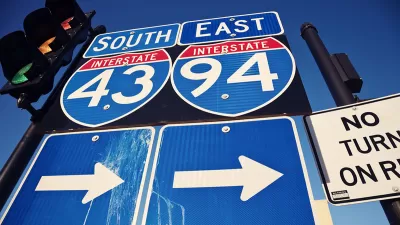Some people call it a road-building program. Others call it "an all out war on urbanism."
Michael Grunwald has produced a large, magazine-style feature for Politico's "The Agenda" series. The feature examines the city of Milwaukee's "addiction to megahighways" as an examples of a proclivity found all over the country.
Grunwald begins by describing the Marquette Interchange, completed in 2008, as the "largest and most complex road project in Wisconsin's history."
"Seven years later, though, the Marquette is no longer an outlier. The state is already building or planning three larger freeway projects in the Milwaukee area alone; the expansion and reconstruction of the nearby Zoo Interchange will cost more than twice as much as the Marquette. It’s all part of a $7 billion effort to widen and modernize the interstates around the city, an effort so massive it has its own line item in the state budget, 'Southeast Wisconsin Freeway Megaprojects.'"
The state's desire to build so many highways, at such extravagant cost, has informed some of Governor (also presidential candidate) Scott Walker's most heated political controversies, including his own party rejecting his road-building program, thus leaving the state budget in limbo, and a federal court ruling that the Wisconsin DOT used faulty projections to justify a highway widening project.
The article relates the example of Milwaukee and Wisconsin to a larger debate—fueled by the ongoing struggles of Congress to produce a long-term transportation-funding bill—about how much should be allocated for maintenance of existing infrastructure versus new construction.
Grunwald also calls on John Norquist, former mayor of Milwaukee and former president of the Congress for New urbanism, who is quoted in the article speaking bluntly about the effects of the Wisconsin road-building program. "It’s an all-out war on urbanism," says Norquist.
FULL STORY: Overpasses: A love story

Planetizen Federal Action Tracker
A weekly monitor of how Trump’s orders and actions are impacting planners and planning in America.

Congressman Proposes Bill to Rename DC Metro “Trump Train”
The Make Autorail Great Again Act would withhold federal funding to the system until the Washington Metropolitan Area Transit Authority (WMATA), rebrands as the Washington Metropolitan Authority for Greater Access (WMAGA).

The Simple Legislative Tool Transforming Vacant Downtowns
In California, Michigan and Georgia, an easy win is bringing dollars — and delight — back to city centers.

The States Losing Rural Delivery Rooms at an Alarming Pace
In some states, as few as 9% of rural hospitals still deliver babies. As a result, rising pre-term births, no adequate pre-term care and "harrowing" close calls are a growing reality.

The Small South Asian Republic Going all in on EVs
Thanks to one simple policy change less than five years ago, 65% of new cars in this Himalayan country are now electric.

DC Backpedals on Bike Lane Protection, Swaps Barriers for Paint
Citing aesthetic concerns, the city is removing the concrete barriers and flexposts that once separated Arizona Avenue cyclists from motor vehicles.
Urban Design for Planners 1: Software Tools
This six-course series explores essential urban design concepts using open source software and equips planners with the tools they need to participate fully in the urban design process.
Planning for Universal Design
Learn the tools for implementing Universal Design in planning regulations.
Smith Gee Studio
City of Charlotte
City of Camden Redevelopment Agency
City of Astoria
Transportation Research & Education Center (TREC) at Portland State University
US High Speed Rail Association
City of Camden Redevelopment Agency
Municipality of Princeton (NJ)





























